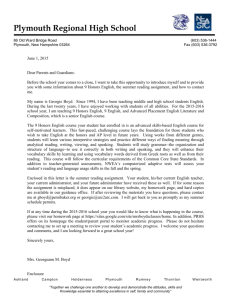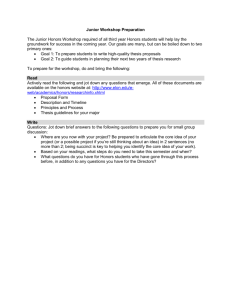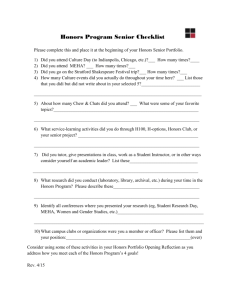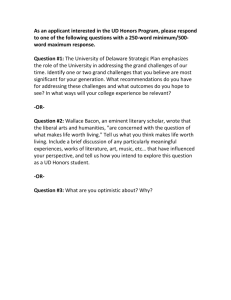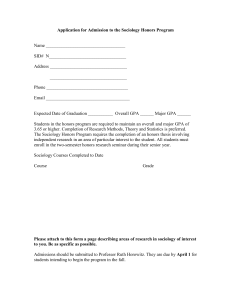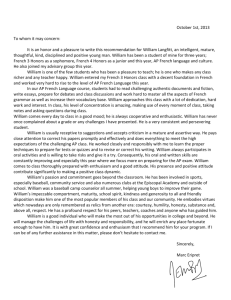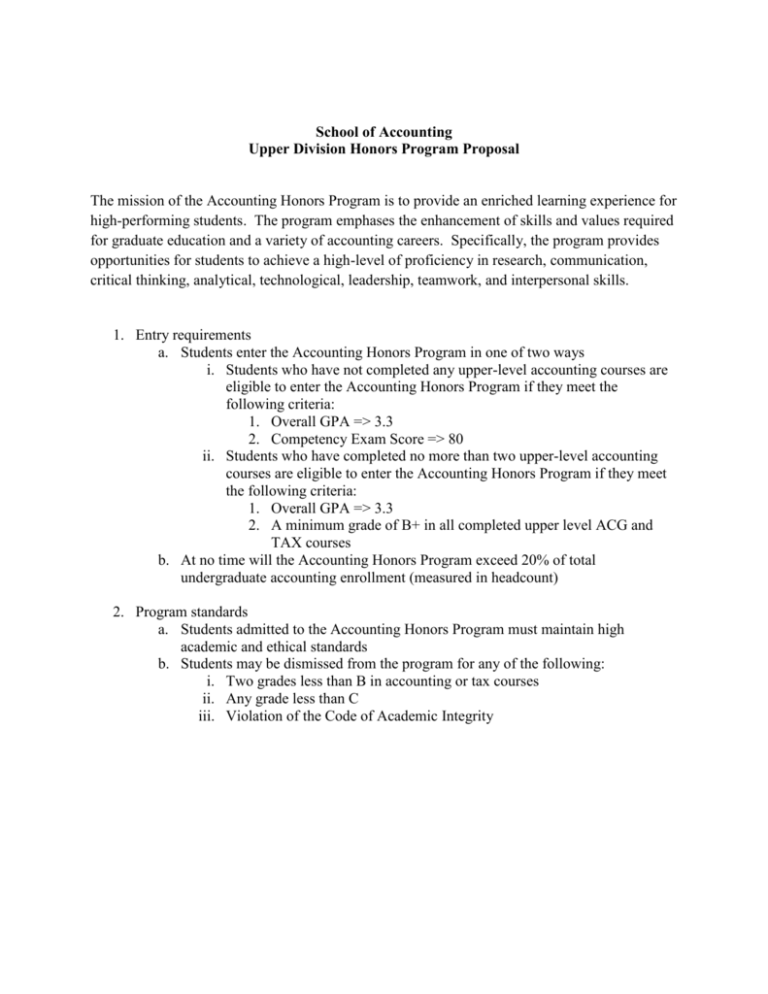
School of Accounting
Upper Division Honors Program Proposal
The mission of the Accounting Honors Program is to provide an enriched learning experience for
high-performing students. The program emphases the enhancement of skills and values required
for graduate education and a variety of accounting careers. Specifically, the program provides
opportunities for students to achieve a high-level of proficiency in research, communication,
critical thinking, analytical, technological, leadership, teamwork, and interpersonal skills.
1. Entry requirements
a. Students enter the Accounting Honors Program in one of two ways
i. Students who have not completed any upper-level accounting courses are
eligible to enter the Accounting Honors Program if they meet the
following criteria:
1. Overall GPA => 3.3
2. Competency Exam Score => 80
ii. Students who have completed no more than two upper-level accounting
courses are eligible to enter the Accounting Honors Program if they meet
the following criteria:
1. Overall GPA => 3.3
2. A minimum grade of B+ in all completed upper level ACG and
TAX courses
b. At no time will the Accounting Honors Program exceed 20% of total
undergraduate accounting enrollment (measured in headcount)
2. Program standards
a. Students admitted to the Accounting Honors Program must maintain high
academic and ethical standards
b. Students may be dismissed from the program for any of the following:
i. Two grades less than B in accounting or tax courses
ii. Any grade less than C
iii. Violation of the Code of Academic Integrity
3. Honors-level enrichment through curricular activities
a. Honors compacts will be available for a total of eight (8) upper-level accounting
and tax courses
b. As a measure of quality control, all honors compacts will be signed by the student
and the professor teaching the restricted section of the course
c. A restricted section of each of the courses with honors compacts will be offered
(see Appendix A for schedule) during the fall and spring semesters
d. Only students in the Accounting Honors Program (see entry requirements and
program standards above) who submit a signed honors compact may register for
restricted sections
e. Restricted sections will be taught by terminally qualified tenured or tenure track
faculty
f. To provide flexibility, students may take either the restricted section of the course
and complete the established honors compact or take a non-restricted section of
the course and complete the established honors compact (see Appendix B for
more detailed information on the structure of the restricted section and compacts)
g. The professor teaching the restricted section of the course will supervise all
honors compacts and determine if the student meets the requirements of the
honors compact
h. Blackboard sites for all students with honors compacts will be maintained
i. Each course will have a unique site
ii. The Blackboard site will provide a connection for all students with honors
compacts in each course regardless of the course section
iii. Honors compacts will be managed through the Blackboard site
i. Each of the honors compacts will have established criteria (see Appendix C for
examples)
j. Honors compact requirements during the first semester will be directed toward
professional development and awareness
k. Honors compact requirements beyond the first semester will require synthesis,
analysis, and application of relevant literature/standards
l. Honors compact requirements will include written memos, summaries and/or
reports (See Appendix D for more details)
m. Honors compact requirements may include individual and/or group assignments
4. Honors-level enrichment through co-curricular activities
a. Students must attend professional and/or student honors association meetings as
prescribed in the honors compacts
b. Students are encouraged to become members and officers of student organizations
c. Students must participate in a peer mentoring program as prescribed by the honors
compacts
i. In the first year of implementation, students from the Accounting Scholars
Program will mentor juniors in the Accounting Honors Program (see
Appendix E for a discussion of the Accounting Scholars Program)
ii. After the first year, seniors in the Accounting Honors Program will mentor
juniors in the Accounting Honors Program
iii. The peer mentoring program will include hosting informational and
networking events for lower-division honors students and other
prospective Accounting Honors Program students1
iv. The peer mentoring program may also include peer mentoring for
accounting students who are not in the Accounting Honors Program
5. Capstone experience
a. Students will complete the capstone experience no more than twelve (12) months
before completion of degree requirements (see Appendix F for details)
b. The capstone experience will consist of a case analysis and presentation (see
Appendix F for details)
c. The capstone experience will be overseen by two terminally qualified tenured or
tenure earning accounting faculty members
d. Accounting professionals will be invited to judge the case competition
6. To be eligible for Accounting Honors at graduation, students must achieve the following
a. Overall GPA => 3.0
b. Accounting GPA (upper level ACG and TAX) => 3.0
c. Complete a minimum of five (5) upper-level accounting honors compacts
d. Complete the capstone experience
e. Complete all Accounting Honors Program requirements within four years after
beginning the Accounting Honors Program
1
Informational and networking events are organized and hosted by students and attended by accounting
professionals. Accounting professionals typically provide a professional development workshop for our students.
The workshop is followed by less formal interaction and networking between the accounting professionals and
students. These workshops and networking events are designed to help our students develop greater professional
awareness and stronger communication skills.
7. Benefits to students include
a. Smaller class sizes taught by award-winning professors
b. Increased opportunities to develop a high-level of proficiency in skills required
for graduate school and many accounting careers
c. Participation in a peer mentor program
d. Increased interaction with other high achieving students
e. Ability to complete a graduate accounting internship class during the senior year
(restricted to students with an approved internship and an overall GPA => 3.3 and
an accounting GPA (upper level ACG and TAX) => 3.3)
f. Ability to complete a restricted section of a graduate business communication
class during the senior year (restricted to students with an overall GPA => 3.3 and
an accounting GPA (upper level ACG and TAX) => 3.3)
g. Expedited admission to graduate school with GMAT waiver (restricted to students
with an overall GPA => 3.3 and an accounting GPA (upper level ACG and TAX)
=> 3.3)
h. Priority for graduate assistantships that include compensation and tuition waiver
i. Participation in the School of Accounting Medallion Ceremony
j. Completion of the undergraduate degree with upper-division honors distinction
Appendix A
Tentative Schedule of Restricted Sections
1. Fall 2012
a. ACG3131
b. ACG3341
2. Spring 2013
a. ACG3131
b. ACG3341
c. ACG3141
d. ACG4401
3. Fall 2013
a. ACG3131
b. ACG3341
c. ACG3141
d. ACG4401
e. TAX4001
f. ACG4651
4. Spring 2014 and onward
a. ACG3131
b. ACG3341
c. ACG3141
d. ACG4401
e. TAX4001
f. ACG4651
g. ACG3151
h. TAX4011
Appendix B
Explanation for Honors Compacts
The School of Accounting is proposing a novel approach for its upper-division honors program.
While other honors programs typically utilize honors courses or honors compacts, we are
proposing a slightly different approach as further explained below.
We believe that it is important that all students desiring to participate in our honors program be
evaluated similarly. In addition, our past experience suggests that restricting students to a singlehonors section precludes many talented and qualified students from participating. However, we
feel that there is value in providing cohort-type experiences whenever possible.
To address these somewhat conflicting forces, we are proposing to offer a restricted section of
each course that has an honors compact option. Only students that are eligible to participate in
the Accounting Honors Program will be given permission to register for the restricted section.
This creates a cohort-type experience for a subset of students participating in the Accounting
Honors Program while not excluding students that are not able to meet the full-time day
commitment. The content of the restricted section will not be significantly different than
material covered in non-restricted sections. The grade for the course will not include the
requirements of the honors compact.
We will not offer any honors courses/sections and all participating students will complete an
identical honors compact. All honors compact work will be evaluated by the professor teaching
the restricted section. After the professor determines that a student has satisfactorily completed
the honors compact, the student will be awarded honors credit for the course.
This approach allows for consistency and maximum participation among our qualified students.
We are especially pleased to be able to include Davie students in our upper-division honors
program.
Appendix C
Sample Requirements for Honors Compact
ACG3131
Honors Compact
In addition to existing course requirements, students completing an honors compact for
ACG3131 (generally the first upper-division accounting course taken) are required to
satisfactorily complete the following:2
1. Attend a minimum of three (3) Beta Alpha Psi and/or Florida Institute of Certified Public
Accountants meetings and write an executive summary for each of the meetings attended.
2. Submit a journal summarizing your mentoring activities for the semester. Each entry
should include topics discussed and outcomes of the discussions. A minimum of three
entries is required.
3. Complete a minimum of three (3) of the following five (5) options:
a. Write a report on financial accounting careers. Assume that you are preparing the
report for prospective accounting students.
b. Write a report on the process and requirements for becoming a CPA in Florida.
Include advantages of being a licensed CPA in your report. Assume that you are
preparing the report for prospective accounting students.
c. Write a report on on-campus recruiting resources.3 Assume that you are
preparing the report for prospective accounting students.
d. Prepare a resume in good form.
e. Write a report of the discussions occurring during a meeting with professor or
faculty advisor.
2
Consistent with most business communication, reports will typically be between one and three pages.
Campus recruiting resources include the Career Development Center, the College of Business Career Resource
Center, Job Fair, Accounting Speed Networking, and Beta Alpha Psi and Accounting Student Association events.
3
Honors Compact
ACG 3341
In addition to existing course requirements, students completing an honors compact for ACG
3341 (Managerial Accounting) must satisfactorily complete the following:
1. Attend a minimum of three (3) Accounting Student Association or Institute of Internal
Auditors meetings and write an executive summary for each of the meetings attended.
2. Prepare a brief paper (about 3 pages) comparing decision making based on three
alternative accounting methods: Full Absorption, Variable, and Through-put. The
student will read the novel The Goal to fully understand this assignment.
3. Complete a minimum of three (3) of the following five (5) options:
a. Write a report on managerial accounting careers. Assume that you are preparing
the report for prospective accounting students.
b. Write a report on the process and requirements for becoming a Certified
Management Accountant or a Certified Internal Auditor
.
c. Write a report on on-campus recruiting resources. Assume that you are preparing
the report for prospective accounting students.
d. Write a report on business and business casual attire. Assume that you are
preparing the report for prospective accounting students.
e. Write a report of discussion between you and a professor or faculty advisor
involving your professional development or career.
ACG3141
Honors Compact
In addition to existing course requirements, students completing an honors compact for
ACG3141 (Intermediate Accounting Theory II) are required to satisfactorily complete the
following:
1. Attend a minimum of three (3) Beta Alpha Psi and/or Florida Institute of Certified Public
Accountants meetings and write an executive summary for each of the meetings attended.
2. Submit a journal summarizing your mentoring activities for the semester. Each entry
should include topics discussed and outcomes of the discussions. A minimum of three
entries is required. The entries can include your role as a mentor or a mentee.
3. Prepare a “memo to the client” for two of the following three topics:
a. Lease accounting: the prospective client will be trying to determine whether to
structure a lease as a capital lease or an operating lease, and the memo will be
designed to inform the client of the balance sheet, income statement, and cash
flow statement effects of capital vs. operating leases.
b. Bonds: the prospective client will be trying to determine whether to retire a
current bond by issuing a new bond, and the memo will be designed to inform the
client of how their decision will affect current and future balance sheets, income
statements, and cash flow statements.
c. Depreciable assets: the prospective client will be trying to determine whether to
use straight line, double declining balance, or sum-of-the-years digits to
depreciate a newly acquired asset. The memo should inform the client as to how
the decision will affect the balance sheets, income statements, and cash flow
statements over the life of the asset.
Appendix D
Justification for Writing Assignments
Accounting is often a misunderstood profession. It is not uncommon for people outside of
accounting to view accountants as ‘bookkeepers’ or ‘tax preparers’ that follow established rules.
In reality, accounting is a complex profession that requires tremendous analytical, critical
thinking and communication skills. Mastering a wealth of technical information (i.e. passing the
CPA exam) is only the beginning. Accountants regularly complete original research as many
business problems faced by accountants are unique and do not fit in a simple framework.
Writing a two-page memo, letter or report may sound simple and elementary; but significant
research is required to support the content of a these very short documents. Business
professionals require information be communicated in a clear and concise way. Preparing our
students to compete in accounting requires us to challenge them to research the relevant literature
or standards and write to their target audience.
The table below illustrates the types of writing that will be required of our successful graduates.
The requirements included in our proposal are designed to prepare our students for these
expectations.
What do Accountants Write?4
Format
Memo
Letter
Letter
Memo
Topic
Results of research
Appropriate tax treatment
Tax issues
Audit work performed
Letter
Advisory letter based on evaluation of accounting
systems and controls
Evaluation of accounting treatment for a business
transaction
Technical
Report
4
Audience
Other members of firm
Client
Internal Revenue Service
Other members of
firm/Client File
Client
Management
Taken from Effective Writing: A Handbook for Accountants, 8th edition, by Claire B. May and Gordon S. May,
published by Pearson Prentice Hall.
Appendix E
Accounting Scholars Program & Demand for Accounting Honors Program
The School of Accounting launched the Accounting Scholars Program in 2007. It is a two-year
program that begins in the senior year. Students are required to complete a rigorous program of
study and participate in numerous professional development activities. Students that successfully
complete the program earn a Bachelor and Master of Accounting.
The inaugural class graduated in 2009 and approximately sixty students have successfully
completed the program in its short history. The program has no formal recognition by the
University. However, it has developed a strong reputation in the professional community.
Accounting firms actively recruit students in the program. Students from the program have been
placed in all of the Big Four public accounting firms5 as well as national, regional and local
public accounting firms, government and industry. Graduates of the program have achieved
100% job placement in accounting.
The Accounting Scholars Program has enjoyed much success and recognition. The proposal for
the Accounting Honors Program builds on the traditions and successes of the Accounting
Scholars Program. We have retained some of the key elements of our existing program, but have
made modifications to allow more inclusivity and flexibility. The School of Accounting
Advisory Council (consisting of accounting professionals) has reviewed the Accounting Honors
Program Proposal and strongly supports the initiative.
5
The Big Four public accounting firms include Deloitte, Ernst & Young, KPMG and PricewaterhouseCoopers.
These firms occupy the top four spots in “Best Places to Launch your Career” in Business Week.
Appendix F
School of Accounting
Florida Atlantic University
Honors Program Capstone Experience
Objective: Provide upper-division accounting students an opportunity to apply knowledge
obtained across prior accounting courses and engage in accounting-based research to solve
contemporary accounting problems.
Honors program integration: The capstone experience will be implemented as a case/research
competition. The capstone experience will be completed by students in their senior year and will
be completed solely outside of class.
Case/Research: Faculty advisors will select a number of accounting cases and/or research
topics for each competition that focus on contemporary accounting issues. Accounting education
journals and Big4 accounting firm resources (e.g., Trueblood cases from Deloitte) will be used as
a source for cases. Cases are typically based on real world problems faced by accountants and
auditors that do not have an obvious answer (or have multiple answers and interpretations).
Many times, the information provided in these cases is incomplete requiring extensive research
and critical thinking. Current deliberations at the FASB and IASB (and related exposure drafts)
will be used to identify controversial accounting issues under debate. By their nature, these
issues represent questions about how to account for items that have not yet been answered. As
such, the student must be able to develop a thorough understanding and critically analyze both
sides of the issue. In both situations, the student is required to identify the options, research the
issues, evaluate the options, decide on the appropriate course of action, and persuade the
audience.
Competition description: Students will work in groups of five (maximum groups per semester
will be ten). The case competition will occur over a week-long period late in the semester. On
Thursday evening, all group members will attend an orientation meeting where the competition
rules and timing will be discussed. Each group will also be provided a case/topic on which to
work over the weekend. Each group must submit one write-up to the faculty advisors by 8:00
am on Monday. The write-up should be in the form of a research paper. On Friday afternoon,
the student groups will present their findings to one of two evaluation committees in a fifteenminute competition. The evaluators will then have fifteen minutes to ask questions. The
presentations will be videotaped for later review. Each evaluation committee will consist of one
of the two faculty advisors, two other accounting faculty members, and two accounting
professionals from local accounting firms and business. After completion of the presentations,
the two evaluation committees will meet, review videos as necessary, and select a winner. The
winner will then be announced at a reception that evening.
Student evaluation: The evaluation will include a team and individual aspect. Each student will
be expected to participate and answer questions in the group presentation. Each student will be
required to submit self and peer evaluations of performance.
Awards: Each member of the winning team will receive a commemorative award/plaque and a
$500 scholarship for further education at FAU. In addition, the winning team will be entered in
a regional case competition where their travel costs will be reimbursed.
Faculty advisors: The capstone experience will be supervised by professors with extensive
experience with cases and similar material.



